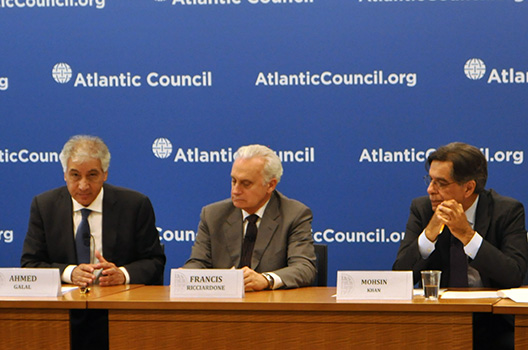 Despite political detours and reservations, Egypt is moving forward and navigating its transition reasonably well, said Ahmed Galal, former Minister of Finance for Egypt and managing director of the Economic Research Forum.
Despite political detours and reservations, Egypt is moving forward and navigating its transition reasonably well, said Ahmed Galal, former Minister of Finance for Egypt and managing director of the Economic Research Forum.
Galal was speaking at a Hariri Center public discussion, “Tackling Egypt’s Economic Dilemma” on September 10, 2014. Atlantic Council Vice President and Hariri Center Director Francis Ricciardone moderated.
Galal stressed the political aspect of the transition because, he pointed out, “it is impossible to separate economics and politics in a transition, and anyone saying [it is possible to do] misses the point.”
As finance minister Galal pushed through a large fiscal stimulus package, and laid the groundwork for a new value-added tax (VAT) law as well as additional income taxes, as a way to boost economic growth and avoid austerity. “There are major economic dividends in political reform,” he said. This was particularly true in Egypt since the January 25 uprising that was the result of both political and economic grievances. “When people streamed into the squares, they demanded, ‘bread, freedom and social justice’. Basically, Egypt had a strong growth rate, but that only benefitted a select few. The widespread poverty and inequality provided a glaring contrast.”
Despite undertaking economic measures to address immediate budgetary and fiscal problems, social inequality and rising poverty are still very much a consideration. Over the past few years, in the aftermath of the uprisings, the turbulence has decimated tourism receipts, slashed productivity by over half, and crippled foreign direct investment (FDI). And although the stimulus package pushed through by the government last year was considerable (almost $4.3 billion), its effects have yet to filter down to the majority of the population, as panelist Mohsin Khan, nonresident senior fellow at the Hariri Center, pointed out. Khan, former director of the Middle East and Central Asia Department at the International Monetary Fund (IMF), said that there were three things that the Abdel Fattah al-Sisi government should do in the short-term to put the Egyptian economy on a growth path.
First, address energy shortages by securing inputs of oil and gas. More importantly, remove energy subsidies, which the government has already begun to do. In July 2014, Egypt slashed petrol and gas subsidies; petrol prices rose an average 42 percent while compressed natural gas prices rose by a staggering 175 percent. Energy subsidies account for over 10 percent of GDP and to date no government has had the courage to tackle the problem given the energy subsidies are the unofficial “third rail of Egyptian politics”. The country is facing power outages, which continue to intensify. Frequent power outages have impacted households, but they also have a real impact on growth since factories are operating well below capacity.
Khan’s second suggestion was that Egypt must stabilize its external finances by reducing debt, and finally attract external financing.
Khan also noted the unfair comparison with transitions in Eastern Europe after the fall of the Soviet system constantly. The Eastern European countries, he said, had an economic model to aspire to: the European Union. . On the other hand, the transitioning Arab economies, he said, have no such model.
Although the panelists were largely in agreement over what needed to be done to move Egypt’s economic recovery forward, there was one point of contention. Khan felt strongly that an IMF deal would not only provide Egypt with much-needed external financing, but would also lend the necessary credibility to help secure external financing from other international financial institutions and European partners, and signals to investors that Egypt is ready to “put its economic house in order,” while Galal noted that it was more important to gain the credibility and buy-in domestically first, in order for any planned reforms to go smoothly.
